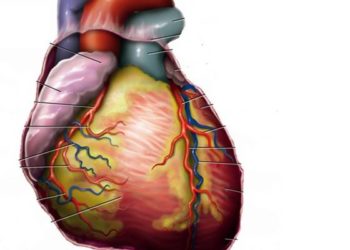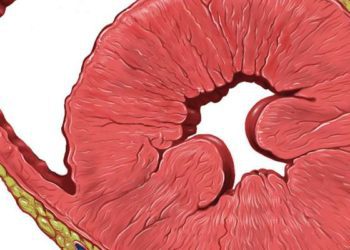Mavacamten shows promise for treating patients with obstructive hypertrophic cardiomyopathy
1. In this open-label clinical trial, mavacamten was found to reduce mean postexercise left ventricular outflow tract gradient after 12 weeks of treatment, which was accompanied by improvements in patient exercise capacity and cardiac symptoms.
2. The most common adverse events related to treatment with mavacamten were reduced left ventricular ejection fraction and atrial fibrillation at higher plasma concentrations of the drug.
Evidence Rating Level: 2 (Good)
Study Rundown: Obstructive hypertrophic cardiomyopathy (oHCM) is a condition that occurs in 70% of patients with HCM, a genetically inherited disease of the heart muscle. Patients with oHCM often have left ventricular hypercontractility, hypertrophy, and left ventricular outflow tract (LVOT) obstruction, among other cardiac abnormalities, leading to symptoms such as shortness of breath and chest pain. The authors of this study aimed to evaluate the role of mavacamten, a small molecular modulator of cardiac myosin, in treating patients with oHCM. The purpose of this study was to evaluate the effectiveness of mavacamten on left ventricular outflow tract (LVOT) gradient. Specifically, the authors characterized pharmacokinetics and pharmacodynamics of mavacamten, assessed drug safety and tolerability and validated proof of concept for this drug. The study concluded that mavacamtem reduced mean postexercise LVOT gradient after 12 weeks of treatment and may therefore be promising as a treatment for patients with oHCM. The major limitations of this study were the nonrandomized design and small sample size. The authors acknowledged that as an open-label phase 2 study they could not draw conclusions regarding the effect of placebo. They have since conducted 2 larger studies based on the results of this trial to further address the study limitations and evaluate the role of mavacamten in oHCM.
Click to read the study in Annals of Internal Medicine
Relevant Reading: A small-molecule modulator of cardiac myosin acts on multiple stages of the myosin chemomechanical cycle
In-Depth [open-label, non-randomized trial]: The authors conducted an open-label, non-randomized phase 2 clinical trial to assess the effectiveness of mavacamten on LVOT gradient. A total of 21 symptomatic patients with oHCM were included in this trial from 5 different academic centers. The trial lasted from October 2016 to November 2017. The main study outcome was assessing change in postexercise LVOT gradient at 12 weeks compared to the participants’ baselines. Patients were divided into cohort A (received 10 to 20 mg/d of mavacamten without background medications) and cohort B (2 to 5 mg/d mavacemten with beta-blocker medication allowed). The authors observed that mavacemten reduced the mean postexercise LVOT gradient from 103 mmHg (SD, 50) at baseline to 19 mmHg (SD, 13) at 12 weeks within cohort A (mean change, -89.5 mmHg [95% CI, -138.3 to -40.7 mmHg] P = 0.008). The postexercise LVOT gradient in cohort B, in contrast, decreased from 86 mmHg (SD, 43) to 64 mmHg (SD, 26) (mean change, -25.0 mmHg [CI, -47.1 to -3.0 mmHg]; P = 0.002). Among participants, mavacamten was generally well tolerated; most adverse events (80%) were described as mild, with 19% described as moderate. In terms of pharmacodynamics, mavacamten reduced LVEF in a concentration-dependent manner. The greatest reductions in LVOT were observed between plasma concentrations from 350 to 695 ng/mL. These study results highlighted a potential role for mavacamten in treating oHCM.
Image: PD
©2019 2 Minute Medicine, Inc. All rights reserved. No works may be reproduced without expressed written consent from 2 Minute Medicine, Inc. Inquire about licensing here. No article should be construed as medical advice and is not intended as such by the authors or by 2 Minute Medicine, Inc.





